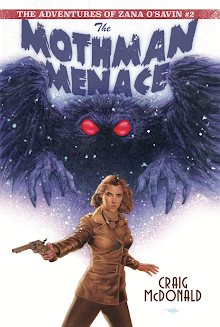The Hector Lassiter novels (ten of them, including HEAD GAMES) frequently incorporate real people.
All of that carries over into HEAD GAMES, THE GRAPHIC NOVEL, coming Oct. 24, 2017 from First Second Books.
The range of “real characters” is prodigious, from the real-life personalities who dominate some of those books’ action, to those real people who are, well, fleeting, yet still influential.
Some are famous, some are even infamous.
Some are little known to the wider public, yet they affected the course of history and the Lassiter series sometimes aims to give these historical ghosts their proper due.
To give a little bonus context to those “characters” who appear in HEAD GAMES: THE GRAPHIC NOVEL, we’re delving into each, here and there, over successive Thursdays…
Novelist/screenwriter Hector Lassiter has two primary
“real-life” sidekicks throughout the 10-volume Lassiter series: novelist Ernest
Hemingway, and filmmaker, amateur magician and actor Orson Welles.
Of the two, Welles is—no pun intended—a larger presence in HEAD GAMES, where we meet the struggling auteur
striving to complete filming of his quirky classic film noir (some would argue
the last true film noir made in the United States), TOUCH OF EVIL.
We visit the set of TOUCH OF EVIL in Venice California, a
once-popular and ritzy community (it actually boasted water-filled canals for a
time eons ago), but since fallen on such hard times that Welles is using it to
convincingly double for an über seedy, Tijuana-style Mexican border town named “Los
Robles.”
We are present for the shooting of the film’s signature
opening scene, a bravura, brashly long tracking shot ending in the explosion of
a bomb we see placed in a car trunk at the scene’s opening. (The most recent
James Bond film, Spectre, paid tribute to this shot in its own long-tracking
shot homage, set in Mexico, during the 007 film’s pre-credits sequence.)
In addition to directing and having rewritten the script for
TOUCH OF EVIL, Welles also acted in the film, playing Captain Hank Quinlan, a
badly widowed man who is a slave to his waistline-expanding addictions (“It’s either
the candy or the hooch” he growls to Marlene Dietrich) and notorious for not
being above deftly framing the actual perp if it will clear a case in absence
of actual evidence.
In addition to HEAD GAMES, we meet younger, more successful versions of Welles in the Hector Lassiter novels THE GREAT PRETENDER (which covers the War of the World’s Panic Broadcast of 1938, as well as Welles’ filming of the classic noir, The Third Man).
Welles is also a key player in TOROS & TORSOS, where we find Orson directing his earlier, still quirkier film noir, THE LADY FROM SHANGHAI, and becoming a person of supreme and dire interest in the grisly murder of would-be actress Elizabeth Short, better known through tabloid headlines as the Black Dahlia, whose 1949 murder remains officially unsolved to this day, in face of a multitude of True Crime paperbacks, each more than a bit dubiously claiming to reveal her true murderer.
Next time: CHARLETON HESTON
THE HECTOR LASSITER SERIES, AS PUBLISHED BY BETIMES BOOKS:













































